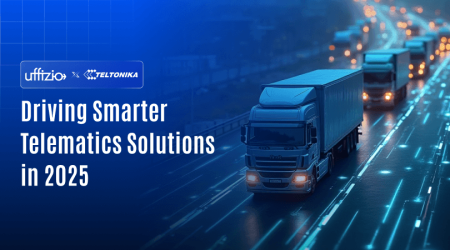Fleet Management Innovations in the Shipping Industries of Singapore

Singapore is a maritime powerhouse, handling over 41 million TEUs in 2024 and maintaining its position among the world’s top two busiest ports. With 130,000+ vessel calls annually and connections to more than 600 ports across 120 countries, it is a cornerstone of global trade. Moreover, as the volume and complexity of shipping operations grow, fleet management has become a strategic priority. This is especially true for shipping companies operating in a high-stakes environment.
Rising fuel prices and International Maritime Organization 2023 carbon intensity regulations are impacting the industry. Increasing pressure for on-time deliveries is pushing companies toward smarter solutions. Consequently, these solutions are increasingly data-driven, helping companies adapt to changing demands and challenges.
From AI-powered route planning and IoT-enabled vessel monitoring to predictive maintenance and blockchain-enabled cargo tracking. Singapore is at the forefront of adopting technologies that enhance efficiency, safety, and compliance.
The Importance of fleet management innovations
Efficient fleet management is critical for the shipping industry. It helps in:
- Reducing operational costs
- Improving fuel efficiency
- Enhancing safety and compliance
- Optimizing route planning
- Ensuring timely maintenance and repairs
Consequently, by adopting advanced fleet management solutions, shipping companies in Singapore can achieve these goals and remain competitive in the global market.
Key innovations in fleet management
- Telematics systems
Furthermore, telematics is at the forefront of fleet management advancements.Using GPS technology, these systems track vessel location, speed, and routes in real time. The data collected helps optimize routes, lower fuel consumption, and enhance safety. - Predictive maintenance
Furthermore, predictive maintenance uses data analytics and machine learning to forecast when a vessel will require servicing. This proactive method prevents unexpected breakdowns, reduces downtime, and improves operational reliability - Autonomous vessels
Autonomous vessels are transforming the shipping industry. Equipped with advanced sensors, AI, and machine learning, they can navigate and operate without human intervention. These ships can boost safety, reduce labor costs, and increase operational efficiency. - Blockchain technology
Blockchain improves transparency and security in fleet management by securely recording transactions and data. It reduces the risk of fraud and errors while streamlining processes such as cargo tracking and documentation. - Internet of things (IoT)
IoT plays a vital role in modern fleet management. Devices installed on vessels monitor fuel consumption, engine performance, and environmental conditions in real time. This information is then used to optimize operations and improve efficiency.
Benefits of fleet management innovations
Enhanced operational efficiency
Innovative fleet management solutions help in streamlining operations. With real-time data and advanced analytics, shipping companies can make informed decisions that enhance efficiency.
Cost reduction
By optimizing routes, improving fuel efficiency, and predicting maintenance needs, fleet management innovations can significantly reduce operational costs. This is crucial for shipping companies operating in a competitive market.
Improved safety
Moreover, safety is considered a top priority in the shipping industry. Advanced fleet management solutions provide real-time monitoring and alerts, helping to prevent accidents and ensure compliance with safety regulations.
Environmental sustainability
Fleet management innovations also contribute to environmental sustainability. By reducing fuel consumption and emissions, these solutions help shipping companies minimize their environmental impact.
Case studies of fleet management innovations in singapore
Case study 1: Telematics implementation
A leading shipping company in Singapore implemented a telematics system to monitor its fleet. The system provided real-time data on vessel location, speed, and fuel consumption. As a result, the company was able to optimize routes, reduce fuel costs, and improve safety.
Case study 2: Predictive maintenance success
Another shipping company in Singapore adopted predictive maintenance technology. By using data analytics to predict maintenance needs, the company reduced downtime and maintenance costs. The proactive approach also improved vessel reliability and safety.
Case study 3: Blockchain for cargo tracking
A major logistics provider in Singapore integrated blockchain technology into its fleet management system. This innovation enhanced transparency and security in cargo tracking and documentation. The use of blockchain reduced errors and fraud, improving overall efficiency.
Challenges in implementing fleet management innovations
Technological integration
Integrating new technologies into existing systems can be challenging but essential. Shipping companies must invest in the right infrastructure and ensure compatibility with current operations to achieve seamless, efficient workflows.
Cost of implementation
The initial cost of implementing advanced fleet management solutions can be high. However, the long-term benefits very often outweigh the initial investments.
Data security
With the increasing use of digital technologies, data security is a major concern. Shipping companies must implement robust security measures to protect sensitive information.
Training and adaptation
Adopting new technologies requires training and adaptation. Therefore, shipping companies need to ensure that their staff are adequately trained to use new fleet management systems.
The future of fleet management in singapore
- Continuous advancements in technology
The future of fleet management in Singapore looks promising, with ongoing adoption of AI, machine learning, and big data analytics to further enhance operations. - Smart ports
The concept of smart ports is gaining traction, using IoT, AI, and automation to improve operational efficiency. These ports provide real-time data and analytics to support better decision-making and resource management. - Digital twins
Digital twin technology, a virtual replica of a vessel, will be used for simulation and analysis. It allows better monitoring, maintenance, and optimization of fleet operations. - Sustainable shipping
Fleet management innovations that improve fuel efficiency and reduce emissions will play a key role in meeting environmental goals. The use of alternative fuels and energy-efficient technologies will also be essential. - Advanced analytics and big data
Big data and analytics will uncover patterns and trends in vast operational data. These insights will help improve efficiency, reduce costs, and predict issues before they occur. Real-time monitoring will ensure smooth operations. - Artificial intelligence (AI) and machine learning (ML)
AI will handle route optimization, maintenance prediction, and safety enhancements. ML will learn from past data to improve decision-making and efficiency, such as analyzing historical voyages to suggest optimal routes. - Enhanced connectivity and 5G
5G technology will bring faster, more reliable communication between vessels and shore. It will enable real-time data exchange, rapid IoT device communication, better monitoring, and more advanced telematics systems. - Cybersecurity measures
Therefore, as digital technologies grow, cybersecurity will be essential. Measures like firewalls, encryption, secure authentication, and regular audits will protect data and ensure smooth operations. - Collaborative platforms
These platforms will improve communication and cooperation between ship owners, operators, and service providers. Centralized information sharing will boost efficiency, decision-making, transparency, and accountability.
Conclusion
Fleet management innovations are transforming the shipping industry in Singapore. Using telematics, predictive maintenance, autonomous vessels, blockchain, and IoT helps shipping companies boost efficiency. These innovations also help reduce costs and improve safety. While there are challenges in implementing these innovations, the long-term benefits are significant.





